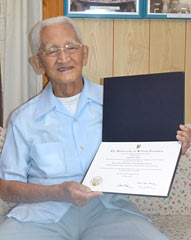Okinawan-Canadian receives honorary degree after 70 years

In Uruma, Roy Oshiro is pleased to hold up his graduation certificate.
November 27, 2012, Masaaki Umeda of Ryukyu Shimpo
Before World War II, Roy Oshiro enrolled at the University of British Columbia in Canada hoping to become a teacher after graduation. However, the war broke out and he was expelled from the university, discriminated against because he was the son of people of Japanese descent. Now, 70 years later, the university has finally admitted that it was wrong and has decided to bestow degrees to Oshiro and 76 other people of Japanese descent who were also forced to leave the university. Oshiro commented, “These sort of things only happen in once in a 1000 years.”
“I was forced to quit my studies at the university despite not having done anything wrong,” said Oshiro, who was born in Canada as a second generation Japanese, the son of Okinawan parents from Gushikawa Village (now known as Uruma City). Wanting to become a teacher, he enrolled at the University of British Colombia in Vancouver in October in 1941, but just two months later Japanese forces attacked Pearl Harbor and WWII broke out. In March 1942, the Canadian government forcibly relocated 21000 people of Japanese descent living in the coastal province of British Colombia. Oshiro was forced to leave the university, and the government seized all of his assets.
He and his family moved to the province of Alberta in the middle of Canada, and worked on a sugar beet farm for bare minimum wages. After that, he went to a teacher-training school in Calgary, the largest city in Alberta, where he obtained a teaching certificate. The war ended as he was working as a teacher.
In order to become more involved in Christian missionary work he went to seminary school in the 1950s and was ordained. In 1955, he arrived in Okinawa and served as a missionary in his parents’ hometown of Uruma until 2006.
The efforts of the Japanese Canadian Citizens Association in Vancouver led to the awarding of these degrees. Several American universities paid tribute to and bestowed honorary degrees upon people of Japanese descent who had been forced to suspend their studies because of the war. Inspired by this example, from 2008, the Association started to approach the University of British Colombia, and their wish came true on May 30 this year when the special graduation ceremony took place.
Among the 76 people who were expelled from the University of British Colombia, including Oshiro, only 11 could attend the ceremony. After receiving the award, Oshiro said, “Although we were in democratic country, we were treated as if we were slaves and we were frustrated to the point of tears. This should not be repeated.”
When Oshiro was still living in Canada people of Okinawan descent were also discriminated against by other Japanese immigrants. Oshiro said, “I did not like it, but it was a life-learning experience.” While he was pleased to receive the award, with tears in his eyes Oshiro said, “These things only happen in once in a 1000 years.”
(English translation by T&CT, Kyoko Tadaoka and Mark Ealey)
Previous Article:Rock band Shores releases its first album called Beginning | End
Next Article:Shipment of Japanese tiger prawns gets into in full swing
[Similar Articles]
- Twenty-nine haiku stone tables placed on Izena Island
- Okinawa University makes deal for exchange program with Ho Chi Minh City University of Teacher Training
- Tatsuhiro Oshiro, first Okinawan to win Akutagawa Prize for work on postwar Okinawa, dies at 95
- Former US soldiers of Okinawan descent; war destroys all
- Group that disseminated Henoko statement worldwide receives Ikemiyagushiku Shui Award
 Webcam(Kokusai Street)
Webcam(Kokusai Street)


